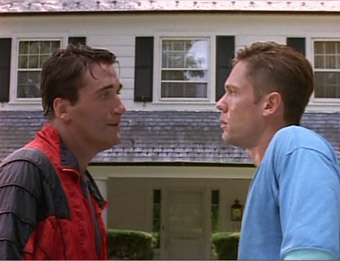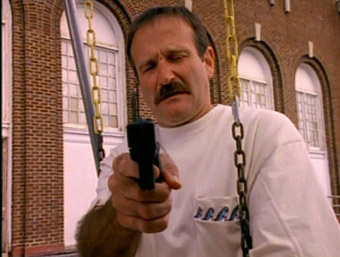|
Part
3: Series 2 Episode Guide
This series consisted of just four episodes, which were
originally aired out of production order, the last episode
shown first to capitalise on Robin's Williams' guest appearance.
The Fremantle disc retains that screening order, while the
A&E release restores the series to the production code
order.
The
spoiler warning from series 1 goes for here too.
10. See No Evil
Screenplay:
Paul Attanasio | Director: Christopher Menaul
| "Life
is simple, homicide is hell. All I need now is a Viking
funeral to
cheer me up." |
| Detective
John Munch |
Series
2 kicks off with a notion that might once have seemed
fanciful but has become wearily familiar in all walks of
business and public service, as the squad are ordered to
attend sensitivity training with the attractive Kerry Weston.
Kay opens up, Bayliss sucks up, Munch gets boastful about
his sex life, and Bolander finds every excuse he can, including
accepting suspension, to avoid it. Out of the squad room,
Beau visits his childhood friend Chucky, whose father, a
proud man known as The Admiral, is terminally ill and is
clearly planning to commit suicide. Beau and Chucky intervene,
but when Chucky later carries out the old man's last wish
and shoots him, Beau is left with a personal dilemma that
puts him into direct and compelling conflict with case primary
Lewis. The ending takes Homicide into intriguing
and difficult moral ground, and it's typical of the show
that it doesn't flinch here.

Internal
politics and personal conflicts rear their head again when
Pembleton investigates a police related killing in a black
neighbourhood and demands that all of the cops on the scene
turn in their weapons for examination. Gee is livid and
refuses the request, so Pembleton goes over his head, further
infuriating his captain. Beau, now in marriage counselling
with his wife, tells Chucky at one point that "I'm
a cop, not even a very good cop," the first sign that
he recognises his own limitations and possible failings.
In the later bust-up with Lewis, this large man comes across
as surprisingly weak, a testament to Baldwin's handling
of the character. It's possibly an in-joke that has Plan
9 From Outer Space playing at the small cinema
opposite the station. Jean A. Segonzac takes over from Wayne
Ewing as DoP.
11. Black and Blue
Screenplay:
James Yoshimura, Tom Fontana | Director: Christopher Menaul
"Live
stupid, die young." |
Detective
Stan Bolander |
Pembleton's
relentless investigation of the police-related shooting
further alienates him from Gee, who is mad from the start
and only gets angrier. Frank's outsider status is enhanced
when he finds Kay and Beau drinking with the very cops he
has been aggressively interviewing – Kay and prime suspect
Lieutenant Jimmy Tyron are old friends and she is in danger
of crossing the line by keeping him informed of their progress.
Gee is convinced that Frank is blind to the idea that it
may have been a civilian who fired the fatal shot, so when
Bayliss brings in a possible suspect, Pembleton enters the
Box and, in a brilliant, terrifying scene, bullies the man
into confessing to something he is clearly innocent of,
purely to make a point to Gee. This is Homicide at its best again – get Pembleton and a suspect in the Box
and the drama catches fire.
In the background, a rather
obviously structured but still engaging story sees Bolander
and Munch swap places in the happy relationship stakes,
prompting the latter to complain bitterly to his partner,
"You don't deserve to be this happy if I'm this miserable!"
A charged, emotive moment of musical bliss for Bolander
breaks a little with the show's handheld aesthetic, but
it works and that's all that counts, and a final backward
drift through the squad room makes for a classy ending.
12. A Many Splendored Thing
Screenplay:
Noel Behn, Tom Fontana | Director: John McNaughton
| |
"I'm saying you got a darkness, you, Tim Bayliss, you got a darkness inside of you. You gotta know the darker, uglier sides of yourself. You gotta recognise them so they're not constantly sneaking up on you. You gotta love them because they're part of you. Because along with your virtues they make you who you are. Virtue isn't virtue unless it comes up against vice. So consequently your virtue's not REAL virtue. Until
it's been tested. Tempted." |
|
Detective
Frank Pembleton to Tim Bayliss |
Pembleton
and Bayliss investigate the strangulation of a girl, a case
that leads them into the world of phone sex and S&M,
something that brings out a puritanical, self-righteous
streak in Tim and lands him in idealistic conflict with
his more open-minded and liberal partner. Stan Bolander, still
basking in the glow of his new age-gap relationship, is
full of the joys of life, which is driving Munch to distraction
and prompts him to complain at length about Stan's good
mood to everybody, even requesting that Gee order him to
revert to his old unhappy self. "There's got to be
something in the books to prevent happiness," he moans.
"It's unprofessional."
Lewis
and Crosetti investigate a killing in a library ("Either
it's murder or this library has a very strict overdue book
policy") that took place over a $1.95 pen that the
victim wouldn't sell to his killer, recalling Bolander's
observation back in Episode 4 that people will kill for
any reason. It leads to a police raid and a superb
bit of production design that once again foreshadows Se7en.
Meldrick cannot understand the killer's thinking, using
his own gold-plated writing implement, bought for him on
his grandmother's dying wish, as an example – "I love
this pen," he tells the more sympathetic Crosetti,
"but not enough to die for."
Stan
and Linda double-date with Kay and Ed Danvers, a meal that
is inevitably interrupted by Munch, outraged that his partner
hasn't told him about his new girlfriend. Invited by her
to stay, he depresses everyone, prompting Stan to warn him
"I'll deal with you in the morning, and DON'T look
forward to it!" and leading to an outdoor scene that flirts
with romantic cliché but never misses a step – you
genuinely smile for the characters. An equally effective
ending of a different sort has Tim accept an unexpected
present, then take his emotional hang-ups to the sleazier
side of the city to contemplate his partner's words of wisdom.
Once again, a terrific character episode, directed with
assurance by John McNaughton, of Henry: Portrait
of a Serial Killer fame.
13: Bop Gun
Screenplay:
David Simon, David Mills | Director: Stephen Gyllenhaal
| |
"The funny thing is, the instant they pulled that trigger I lost my wife, but I joined a club. It's a very exclusive club. But the funny thing about the club is none of the members want to belong. It's like some sort of secret society where only the initiated can recognise the other members. Here comes an associate member. She probably had someone close to her killed, but not that close, maybe a mother-in-law. There's a long
term member – he's seen a lot of people go. There's thousands of us. And it's growing each year. And we all end up talking to some poor Homicide detective like you and asking, 'Why? Why me?' But the truth
is it's not 'why me?' any more but 'when me?'." |
|
Robert
Ellison reflects on his wife's murder |
Example
number two of why Homicide: Life on the Street was the greatest show on American television, this brilliant,
emotionally overpowering episode marked a change of direction
for the series and foreshadowed the slight stylistic shift
of the third season in a number of ways. Originally screened
to open the insanely short second season, it was actually
shot last (the production code is 204 – season 2, episode
04) and is restored to its rightful place as the series
closer on the A&E DVDs. There's no doubt that it belongs
at the end, as a season-closing humdinger and a cinematic
precursor to season 3, which it could almost be part of.

From
the first second of the pre-title sequence we are on new
turf, and those familiar with later episodes will recognise
the style. Instead of natural sounds and dialogue, the soundtrack
is dominated by a music track (Killer by Seal), over which
plays out a prelude to a terrible inevitability, as three street
punks play basketball and mess around with a handgun, while
a sightseeing family from out of town unknowingly wander
into an area any local could have told them is best avoided.
As the punks spot the family and head after them, the picture
and music fade, and we don't need to see what happens next
to know where we will be after the title sequence. This
rock-scored prologue may hint at an MTV influence, but is
too purposeful, too foreboding, too well ingrained into the
texture of the show itself to feel like a music video bolt-on.
It was to crop up again later, most memorably in the superbly
edited prologue of season 5's Prison Riot. Source
music is also used later in the episode (Feels Like Rain by Buddy Guy) to accompany Beau and Kay's end-of-episode
prison visit in a manner that would become part of the signature
style of season 3, and contribute to some of its most memorable
sequences.
More
crucially, this was the first episode to feature a single
storyline rather than multiple cases and the first to focus
on the emotional consequences of the crimes the unit deal
with on a daily basis, on the husband and children of the
victim and what the sudden, senseless killing of a loved
one does to them. Now if the thought of Robin Williams –
yes, THAT Robin Williams – playing the part of a grieving
husband makes you groan then I am telling you right now
to put those prejudices aside and just watch what the man
does with this part, giving a performance that may just
count as a career best. It's inspired casting – Williams
perfectly captures not just the pain of loss, but the anger
at the detectives' seemingly flippant handling of the case
and the sense of isolation he feels as the only helpless
figure in the machinery of investigation. Indeed, there are
times when you sympathise so strongly with his emotional
state that you share his fury at characters you have previously
been rooting for. But Williams is not alone – everyone hits
the right note here, right down to Ellison's two young kids,
the small age gap between them proving the dividing line
between the expectation of a mother's return and the realisation
that she's gone forever. The very real grief expressed by
the 14-year-old Matt is especially heartbreaking – look
closely and you'll realise that he is played by a young
Jake Gyllenhaal, and the observant will have spotted that
the episode was directed by his father Stephen. The investigation
of the crime remains a compelling component, and a dual
interrogation of two suspects prefigures a similarly sneaky
approach employed by Ed Exley in L.A. Confidential.
This episode was co-written by David Simon, author of the
book on which the series is based.
<<
Page 2: Series 1 Episode Guide | Page
4: The DVDs >>
|